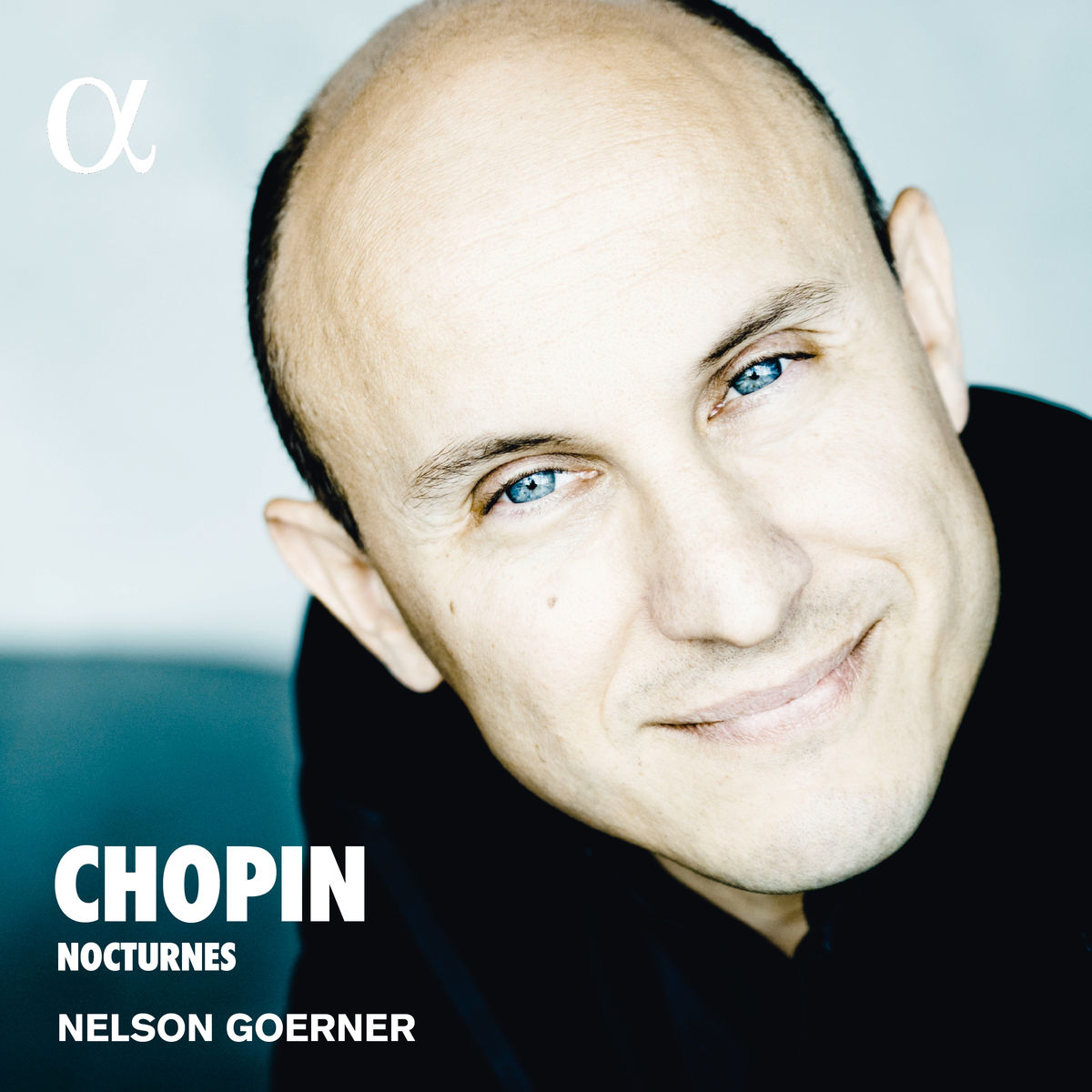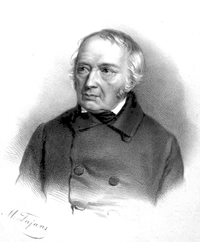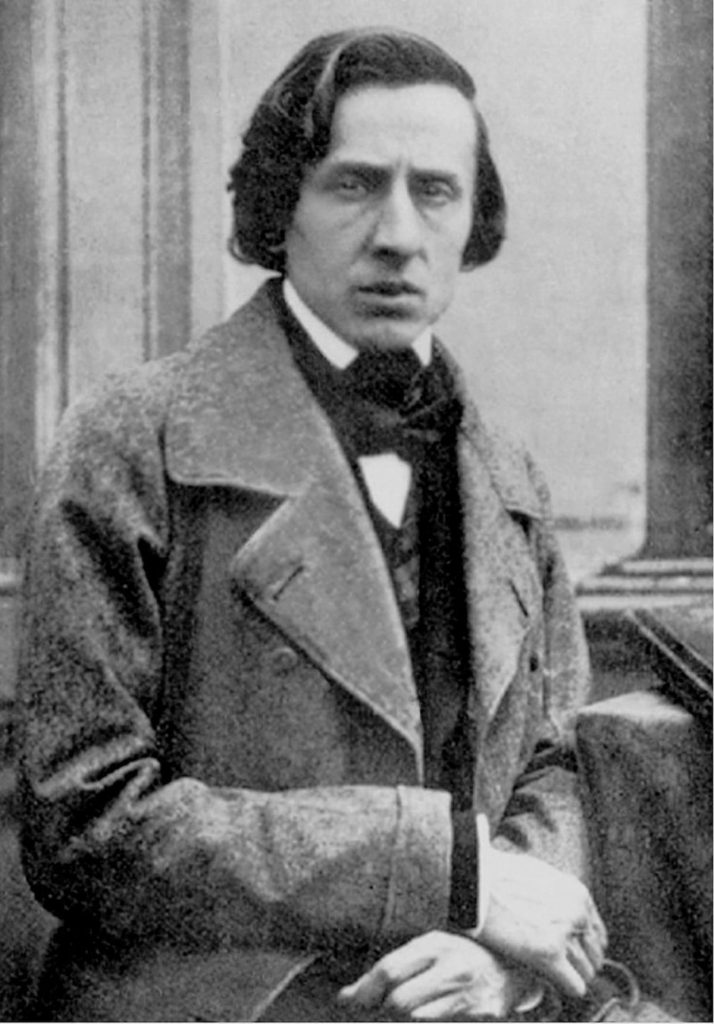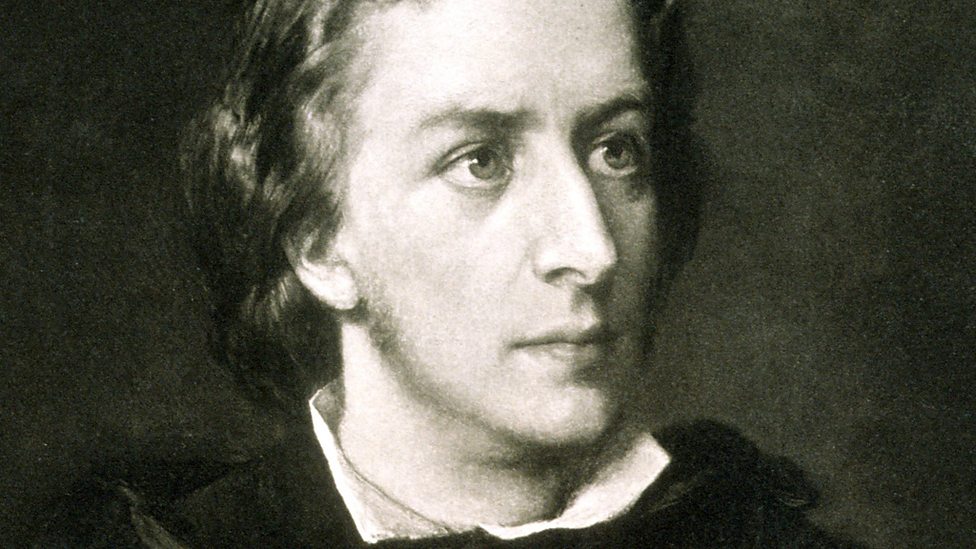
Frédéric François Chopin1 March 1810 – 17 October 1849) was a Polish composer and virtuoso pianist of the Romantic era who wrote primarily for solo piano. He has maintained worldwide renown as a leading musician of his era, one whose “poetic genius was based on a professional technique that was without equal in his generation.”[3]
Chopin was born Fryderyk Franciszek Chopin in the Duchy of Warsaw and grew up in Warsaw, which in 1815 became part of Congress Poland. A child prodigy, he completed his musical education and composed his earlier works in Warsaw before leaving Poland at the age of 20, less than a month before the outbreak of the November 1830 Uprising. At 21, he settled in Paris. Thereafter—in the last 18 years of his life—he gave only 30 public performances, preferring the more intimate atmosphere of the salon. He supported himself by selling his compositions and by giving piano lessons, for which he was in high demand. Chopin formed a friendship with Franz Liszt and was admired by many of his other musical contemporaries (including Robert Schumann).
After a failed engagement to Maria Wodzińska from 1836 to 1837, he maintained an often troubled relationship with the French writer Amantine Dupin !!! volgens mij Aurora Dupin (known by her pen name, George Sand). A brief and unhappy visit to Majorca with Sand in 1838–39 would prove one of his most productive periods of composition. In his final years, he was supported financially by his admirer Jane Stirling, who also arranged for him to visit Scotland in 1848. For most of his life, Chopin was in poor health. He died in Paris in 1849 at the age of 39, probably of pericarditis aggravated by tuberculosis.
All of Chopin’s compositions include the piano. Most are for solo piano, though he also wrote two piano concertos, a few chamber pieces, and some 19 songs set to Polish lyrics. His piano writing was technically demanding and expanded the limits of the instrument: his own performances were noted for their nuance and sensitivity. Chopin invented the concept of the instrumental ballade. His major piano works also include mazurkas, waltzes, nocturnes, polonaises, études, impromptus, scherzos, preludes and sonatas, some published only posthumously. Among the influences on his style of composition were Polish folk music, the classical tradition of J. S. Bach, Mozart, and Schubert, and the atmosphere of the Paris salons of which he was a frequent guest. His innovations in style, harmony, and musical form, and his association of music with nationalism, were influential throughout and after the late Romantic period.
Chopin’s music, his status as one of music’s earliest superstars, his (indirect) association with political insurrection, his high-profile love-life, and his early death have made him a leading symbol of the Romantic era. His works remain popular, and he has been the subject of numerous films and biographies of varying historical fidelity.
Fryderyk Chopin was born in Żelazowa Wola, 46 kilometres (29 miles) west of Warsaw, in what was then the Duchy of Warsaw, a Polish state established by Napoleon. The parish baptismal record gives his birthday as 22 February 1810, and cites his given names in the Latin form Fridericus Franciscus[(in Polish, he was Fryderyk Franciszek). However, the composer and his family used the birthdate 1 March, which is now generally accepted as the correct date.

Chopin’s father, Nicolas Chopin, by Ambroży Mieroszewski, 1829

Watch given by soprano Angelica Catalani to 9-year-old Chopin on 3 January 1820
Fryderyk’s father, Nicolas Chopin, was a Frenchman from Lorraine who had emigrated to Poland in 1787 at the age of sixteen. Nicolas tutored children of the Polish aristocracy, and in 1806 married Tekla Justyna Krzyżanowska, a poor relative of the Skarbeks, one of the families for whom he worked.[10] Fryderyk was baptised on Easter Sunday, 23 April 1810, in the same church where his parents had married, in Brochów. His eighteen-year-old godfather, for whom he was named, was Fryderyk Skarbek, a pupil of Nicolas Chopin. Fryderyk was the couple’s second child and only son; he had an elder sister, Ludwika (1807–1855), and two younger sisters, Izabela (1811–1881) and Emilia (1812–1827). Nicolas was devoted to his adopted homeland, and insisted on the use of the Polish language in the household.[4]
In October 1810, six months after Fryderyk’s birth, the family moved to Warsaw, where his father acquired a post teaching French at the Warsaw Lyceum, then housed in the Saxon Palace. Fryderyk lived with his family in the Palace grounds. The father played the flute and violin;[12] the mother played the piano and gave lessons to boys in the boarding house that the Chopins kept.[13] Chopin was of slight build, and even in early childhood was prone to illnesses.
Fryderyk may have had some piano instruction from his mother, but his first professional music tutor, from 1816 to 1821, was the Czech pianist Wojciech Żywny. His elder sister Ludwika also took lessons from Żywny, and occasionally played duets with her brother. It quickly became apparent that he was a child prodigy. By the age of seven Fryderyk had begun giving public concerts, and in 1817 he composed two polonaises, in G minor and B-flat major. His next work, a polonaise in A-flat major of 1821, dedicated to Żywny, is his earliest surviving musical manuscript.[15]
In 1817 the Saxon Palace was requisitioned by Warsaw’s Russian governor for military use, and the Warsaw Lyceum was reestablished in the Kazimierz Palace (today the rectorate of Warsaw University). Fryderyk and his family moved to a building, which still survives, adjacent to the Kazimierz Palace. During this period, Fryderyk was sometimes invited to the Belweder Palace as playmate to the son of the ruler of Russian Poland, Grand Duke Constantine Pavlovich of Russia; he played the piano for Constantine Pavlovich and composed a march for him. Julian Ursyn Niemcewicz, in his dramatic eclogue, “Nasze Przebiegi” (“Our Discourses”, 1818), attested to “little Chopin’s” popularity.
Education
From September 1823 to 1826, Chopin attended the Warsaw Lyceum, where he received organ lessons from the Czech musician Wilhelm Würfel during his first year. In the autumn of 1826 he began a three-year course under the Silesian composer Józef Elsner at the Warsaw Conservatory, studying music theory, figured bass, and composition.[Throughout this period he continued to compose and to give recitals in concerts and salons in Warsaw. He was engaged by the inventors of the “aeolomelodicon” (a combination of piano and mechanical organ), and on this instrument, in May 1825 he performed his own improvisation and part of a concerto by Moscheles. The success of this concert led to an invitation to give a recital on a similar instrument (the “aeolopantaleon”) before Tsar Alexander I, who was visiting Warsaw; the Tsar presented him with a diamond ring. At a subsequent aeolopantaleon concert on 10 June 1825, Chopin performed his Rondo Op. 1. This was the first of his works to be commercially published and earned him his first mention in the foreign press, when the Leipzig Allgemeine Musikalische Zeitung praised his “wealth of musical ideas”.[20]

Józef Elsner (after 1853)
During 1824–28 Chopin spent his vacations away from Warsaw, at a number of locales.[ In 1824 and 1825, at Szafarnia, he was a guest of Dominik Dziewanowski, the father of a schoolmate. Here for the first time, he encountered Polish rural folk music.His letters home from Szafarnia (to which he gave the title “The Szafarnia Courier”), written in a very modern and lively Polish, amused his family with their spoofing of the Warsaw newspapers and demonstrated the youngster’s literary gift.[23]
In 1827, soon after the death of Chopin’s youngest sister Emilia, the family moved from the Warsaw University building, adjacent to the Kazimierz Palace, to lodgings just across the street from the university, in the south annexe of the Krasiński Palace on Krakowskie Przedmieście,where Chopin lived until he left Warsaw in 1830.[ Here his parents continued running their boarding house for male students; the Chopin Family Parlour (Salonik Chopinów) became a museum in the 20th century. In 1829 the artist Ambroży Mieroszewski executed a set of portraits of Chopin family members, including the first known portrait of the composer.
Four boarders at his parents’ apartments became Chopin’s intimates: Tytus Woyciechowski, Jan Nepomucen Białobłocki, Jan Matuszyński and Julian Fontana; the latter two would become part of his Paris milieu. He was friendly with members of Warsaw’s young artistic and intellectual world, including Fontana, Józef Bohdan Zaleski and Stefan Witwicki.He was also attracted to the singing student Konstancja Gładkowska. In letters to Woyciechowski, he indicated which of his works, and even which of their passages, were influenced by his fascination with her; his letter of 15 May 1830 revealed that the slow movement (Larghetto) of his Piano Concerto No. 1 (in E minor) was secretly dedicated to her – “It should be like dreaming in beautiful springtime – by moonlight.His final Conservatory report (July 1829) read: “Chopin F., third-year student, exceptional talent, musical genius. https://en.wikipedia.org/wiki/Fr%C3%A9d%C3%A9ric_Chopin
nelson goerner “the master goldsmith at the piano” – Le Monde
[“..en maître orfèvre courbé sur le clavier”]
Nelson Goerner is one of today’s greatest classical pianists. He is heralded for his performances of the highest art and poetry, while at the same time possessing exhilarating and masterful conviction.
“He remains no less than one of the great performers of today” – Le Temps
[“ll n’en reste pas moins l’un des grands interprètes d’aujourd’hui”]
In the 2019-20 season Nelson Goerner will give recitals on some of the world’s most important stages, including Paris’s Théâtre des Champs-Elysées, London’s Wigmore Hall, Brussels’ BOZAR and Toulouse’s Cloitre des Jacobins, and give concerto appearances with La Monnaie Symphony Orchestra and Alain Altinoglu, the Orchestre Philharmonique de Radio France and Myung-Whun Chung, and the Luzerner Sinfonieorchester under Lawrence Foster.
“Majestic in Chopin, unquestionable in Debussy, the Argentinian pianist Nelson Goerner is one of those discreet artists whose career is immense.” – Le Monde
[“Souverain dans Chopin, incontestable dans Debussy, à 46 ans, le pianiste argentin Nelson Goerner fait partie de ces artistes discrets dont la carrière est immense.”]
Nelson Goerner has performed with many of today’s major orchestras including the Philharmonia Orchestra, Orchestre de Paris, London Philharmonic Orchestra, Deutsche Kammerphilharmonie, Hallé Orchestra, Sinfonia Varsovia and NHK Symphony Orchestra, and with several of today’s leading conductors such as Vladimir Ashkenazy, Philippe Herreweghe, Neeme Järvi, Sir Mark Elder, Paavo Järvi, Vassily Sinaisky, Jonathan Nott, Fabio Luisi and Esa-Pekka Salonen. His festival appearances include today’s most prestigious engagements, including Salzburg Festival, La Roque d’Anthéron, La Grange de Meslay, Edinburgh International Festival, Festival de Verbier, La Folle Journée (Nantes and Tokyo), Schleswig-Holstein, Warsaw’s ‘Chopin and his Europe’ and the BBC Proms.
A keen chamber musician, Nelson Goerner has collaborated with artists such as Martha Argerich (in repertoire for two pianos), Janine Jansen, Steven Isserlis and Gary Hoffman. The 2019-20 season will include a series of duo recitals with Sol Gabetta in Italy and Renaud Capuçon in Switzerland.
Nelson Goerner has a strong relationship with the Mozarteum Argentino in Buenos Aires and enjoys a long association with the Chopin Institute in Warsaw, where he is a member of the artistic advisory committee. He has released several albums of unusual repertoire on the Institute’s own record label, the latest, in 2019, featuring works by Godowski and Paderewski, including the latter’s monumental Variations and Fugue op.23. His recording of the Chopin Ballades and Nocturnes was recognised with a Diapason d’Or.
“Goerner’s Chopin was special right from the start of his career, but it has matured into something remarkable now…5*/5*” – BBC Music Magazine, Instrumental Choice
Nelson Goerner records predominantly for Alpha Classics and his discography for them includes works by Chopin, Beethoven, Brahms, Debussy, Schumann, Fauré and Franck. Many of Goerner’s albums have been named “reference” recordings. Accolades include: Diapason d’Or of the Year for his recording of Debussy; BBC Music Magazine’s Recording of the Month for his album of works by Schumann; Choc de Classica and Diapason d’Or for his Chopin Preludes album; plus resounding critical acclaim for his recording of Beethoven’s Hammerklavier Sonata Op 106.
Details of Nelson Goerner’s complete discography can be found here.
Nelson Goerner was born in San Pedro, Argentina, in 1969. After studying in Argentina with Jorge Garrubba, Juan Carlos Arabian and Carmen Scalcione, he was awarded First Prize in the Franz Liszt Competition in Buenos Aires in 1986. This led to a scholarship to work with Maria Tipo at the Geneva Conservatoire, and in 1990 Nelson Goerner won the First Prize at the Geneva Competition.
Nelson Goerner lives in Switzerland with his wife and son. He is a proud and active supporter of the humanitarian organisation, Ammala.
“Quiet greatness……Tempestuousness and with a mature sense of calm, silken gestures and predatory attacks….all alternate with astonishing results.” – Leipziger Volkszeitung[“Stille Grösse…..Rasanz und abgeklärte Ruhe, Samtpfoten und Raubtierpranke wechseln einander ab, teils mit verblüffenden Ergebnissen.”] https://www.nelsongoerner.com/biography-en/



https://www.classicfm.com/composers/chopin/news/how-chopin-died/
